A pathology such as serotonin syndrome is a rare, but serious disorder. It leads to disruption of the nervous system. Its appearance is a reaction to improper use of antidepressants.
Record content:
- 1 What is Serotonin Syndrome?
- 2 The mechanism of development when taking antidepressants
- 3 Causes
-
4 Symptoms
- 4.1 Mental disorders
- 4.2 Vegetative symptoms
- 4.3 Neuromuscular symptoms
- 5 The severity of serotonin syndrome
- 6 Development speed and duration
- 7 Diagnostics
- 8 Treatment
- 9 Preventive measures
- 10 Consequences
- 11 Video about serotonin syndrome
What is Serotonin Syndrome?
The first description of this disease appeared in 1960, when warning symptoms were noticed in sick people taking antidepressants. Serotonin syndrome is a potentially deadly pathology that occurs due to the high content of serotonin in the body.
Serotonin production is disrupted by the use of 3rd generation antidepressants, which are used to treat depression and anxiety disorders.
An increase in the level of serotonin in the human body can be caused by:
- tricyclic and tetracyclic antidepressants;
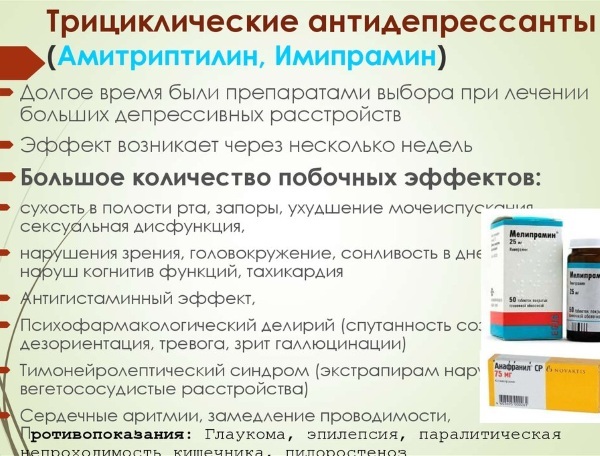
Serotonin syndrome can occur with tricyclic antidepressants - Tryptophan;
- amphetamines;
- MAO inhibitors;
- medicines containing lithium;
- Pentazocine and Bromocriptine;
- serotonin reuptake inhibitors.
Serotonin syndrome when taking antidepressants occurs in 70-75% of people in a mild form. Severe cases leading to neurological disease and death are rare. Serious health problems can appear if you ignore the symptoms of the disease and do not start treatment on time.
The mechanism of development when taking antidepressants
Serotonin is a neurotransmitter that regulates a person's behavior or emotional state. The most important function of this active biological substance is considered to be the transmission of impulses between body cells and the brain or between neurons. It suppresses the activity of negative emotions and controls them.
Other functions of serotonin include:
- lowering the pain threshold;
- increased blood clotting;
- the formation of a blood clot in places with open wounds;
- controlling the process of relaxation of the bronchi;
- ensuring proper rest during sleep;
- regulation of vascular tone;
- elimination of the feeling of nausea;
- improved thermoregulation;
- stimulation of active and cognitive activity;
- maintaining normal libido in both males and females;
- positive impact on reproductive performance;
- preservation of long-term memory;
- regulation of gastric motility and intestinal motility;
- controlling appetite;
- ensuring an adequate perception of the world.
The amount of serotonin is regulated by the return of the substance, enzymes responsible for its breakdown, and the brain using feedback. Due to an excess of serotonin in the body, all processes in which it participates are disrupted. At the beginning, the development of the disease will affect the synaptic cleft.
This is the space between the membranes of neurons. It will fill with a lot of serotonin, which will lead to overexcitation of serotonin receptors. A high serotonin content will also stop the enzymes from breaking down and disrupt the return of the substance.
Causes
Most often, the appearance of serotonin syndrome is associated with excessive use of an antidepressant.
In addition, the cause of the development of the disease can be:
- the simultaneous use of several drugs that increase the content of serotonin in the body;
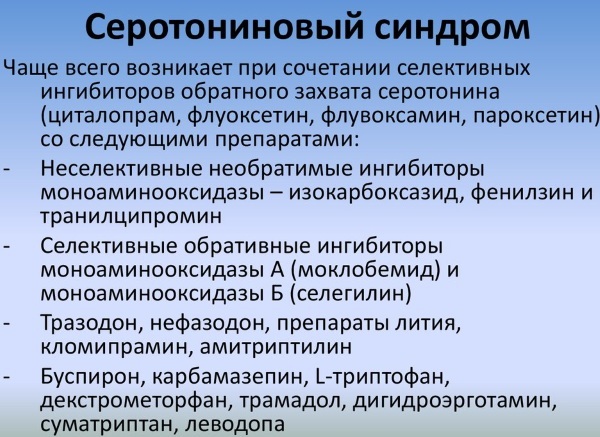
- a sharp transition from one antidepressant to another;
- drinking alcoholic beverages together with antidepressants;
- the simultaneous use of antidepressants with drugs that normalize body weight, antitussive, antiemetic, antibacterial agents, and so on;
- taking drugs.
Serotonin syndrome can occur in people of different ages when taking antidepressants. Both retirees and newborns can get this disorder due to intrauterine exposure.
People with cardiovascular disease and dehydration are more likely to suffer from serotonin syndrome. Also at risk are people who have intolerance to a certain drug containing serotonin, chronic or acquired liver and kidney disease, physical overload of the body.
Symptoms
Serotonin intoxication manifests itself in the form of specific symptoms. These can be abnormalities in the psyche, autonomic changes and disruptions in the neuromuscular system. When a disease occurs, symptoms from different groups may appear.
Mental disorders
First of all, a patient with serotonin syndrome will face mental disorders, which will begin to progress rapidly.
The main mental abnormalities in serotonin syndrome:
- sudden emotional agitation;
- inability to navigate in space;
- anxious feeling, suddenly changing to euphoria;
- weakened reaction to external stimuli;
- drowsiness and loss of energy;
- hallucinations and confusion;
- manic-depressive state, turning into psychosis in the absence of timely treatment;
- insomnia;
- obsessions.
In very advanced cases, a person can be delirious and fall into a severe coma. These are the most life-threatening symptoms of the disease.
Vegetative symptoms
Serotonin syndrome while taking antidepressants can cause autonomic symptoms. Symptoms of the disease are usually represented by malfunctioning of the digestive system.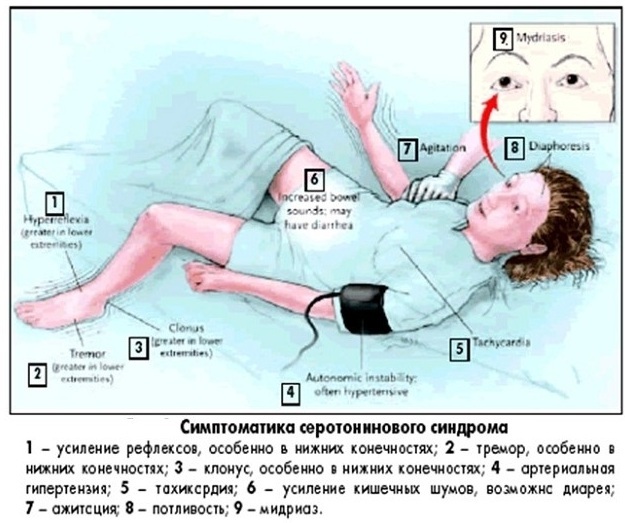
Autonomic symptoms of serotonin syndrome include:
- acute abdominal pain;
- nausea followed by vomiting;
- upset stool in the form of diarrhea;
- shallow and rapid breathing;
- sharp jumps in blood pressure;
- severe paroxysmal headaches;
- excessive sweating;
- increased tearing;
- drying out of the mucous membranes in the oral cavity;
- accelerated heart rate;
- chills;
- visual impairment.
With a severe stage of the disease, the body temperature rises to 40-42 ° C. This is the most dangerous vegetative symptom. This often happens shortly before death occurs.
Neuromuscular symptoms
Among the neuromuscular manifestations of the disease, there is a mechanical contraction of muscles or muscle fibers. Due to uncontrolled muscle contraction, the patient may lose the ability to clearly reproduce speech.
| Symptoms | Description |
| Neuromuscular symptoms |
|
With a severe complication, the face loses its facial expressions, the skin becomes greasy, sweat is profuse and the temperature rises. This condition can be fatal.
The severity of serotonin syndrome
Serotonin syndrome has 3 degrees of severity. The disease can be mild, moderate, or severe.
Each of them is characterized by certain symptoms:
- Easy stage. The disease, which is mild, is accompanied by an increased heart rate, increased sweating and slightly trembling limbs. Also, the patient's pupils dilate and reflexes slightly increase. At the same time, there are no changes in body temperature. This clinical picture may resemble chronic fatigue. A patient with mild serotonin syndrome is usually unaware of his diagnosis and does not seek help from a medical facility. Because of this, the disease continues to develop. Symptoms are easiest to eliminate early on.
-
Middle stage. With a disease of moderate severity, there is an increase in blood pressure, tachycardia, severe pain in the epigastric region and increased intestinal motility. Also, this stage is characterized by involuntary oscillatory eye movements and a sharp increase in body temperature up to 40 ° C. The mental agitation of a person also begins to be traced, during which there is a significant increase in reflexes and trembling of the limbs.
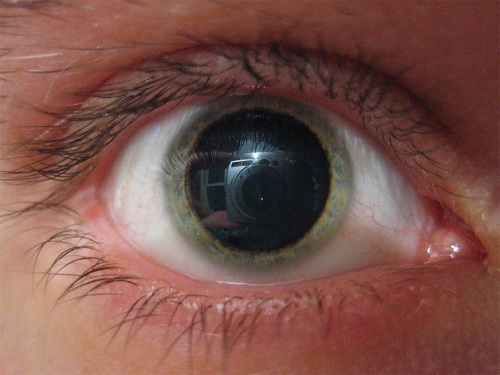
- Severe stage. The disease in severe form poses a serious threat to human life. At this stage, the patient suffers from very high blood pressure, severe tachycardia and cannot navigate in space and time. In addition, strong hallucinations appear, the blood ceases to coagulate, the work of consciousness is disrupted and increased sweating appears. After this, a disorder of acid-base balance, decay of muscle tissue may occur. Also, the liver and kidneys may not cope with the load, which will lead to damage to other human organs. As a result, the patient runs the risk of falling into a coma and dying. Severe serotonin syndrome is rare.
Development speed and duration
Serotonin syndrome is rapidly developing with antidepressants. The first symptoms can be observed a few minutes after using the drug that provokes the syndrome. They also occur within a few minutes after switching to another drug or changing the dosage of the drug.
According to statistics, in 50% of patients, the development of the disease occurs during the first 2 hours. In 25% of cases, people develop serotonin syndrome within 24 hours.
Another 25% of those taking medications containing serotonin develop the disease after a day. Some patients are at risk of death. Timely medical assistance will help to reduce the rate of development of the syndrome.
Diagnostics
Serotonin syndrome is difficult to diagnose. The disease has many symptoms that are common to other diseases. Also, diagnosis is difficult due to the lack of changes in the biochemical blood test.
An accurate diagnosis can be made only if the patient simultaneously manifests mental, autonomic and neuromuscular symptoms. If the signs of serotonin disorder cover only one of the body systems, then the diagnosis is impossible. In most cases, the clinical picture of the disease reflects 2-3 pronounced symptoms from different body systems.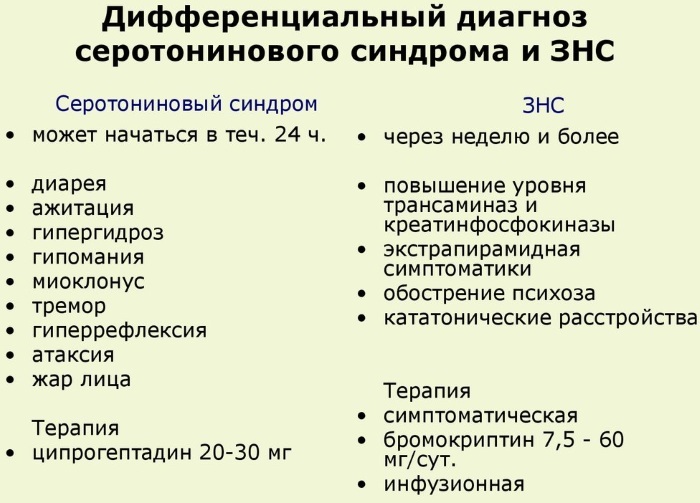
To detect serotonin syndrome, a physical examination is performed and all medications that the patient was taking are examined. It is also important to know whether the potential patient has consumed alcoholic beverages or drugs. At the same time, diseases with similar symptoms are excluded.
A physical examination will help determine:
- muscle tone;
- pupillary reactions;
- tendon reflexes;
- skin tone and so on.
There is a possibility of detecting the disease at an early stage of development. Some diagnostic measures will help with this. For this, the patient must continue to take medications containing serotonin. After increasing the dose or adding an additional agent, the patient's condition begins to be monitored.
The manifestations of serotonin syndrome include noticeable changes in behavior, emotional state, physical activity and impaired stool, sweating. In addition to information on the drugs taken, data on acquired or chronic pathologies with an indication of the severity will be required.
Serotonin syndrome cannot be detected using specially designed tests and methods. The results of laboratory tests do not indicate any significant changes and are within the normal range.
However, the following laboratory parameters can make the diagnosis a little easier:
- increased content of leukocytes in the blood;
- exceeded CPK level, indicating damage to muscle tissue;
- Decreased bicarbonate levels, indicating an increase in acidity in the body.
Laboratory tests will be most effective in detecting the effects of serotonin syndrome.
Treatment
Serotonin syndrome should be treated immediately after detection. A person who becomes ill after taking antidepressants should see a qualified doctor. At the beginning of therapy, the patient will stop using drugs that increase the production of serotonin. The patient's condition at an early stage will begin to gradually improve within 24 hours after drug withdrawal.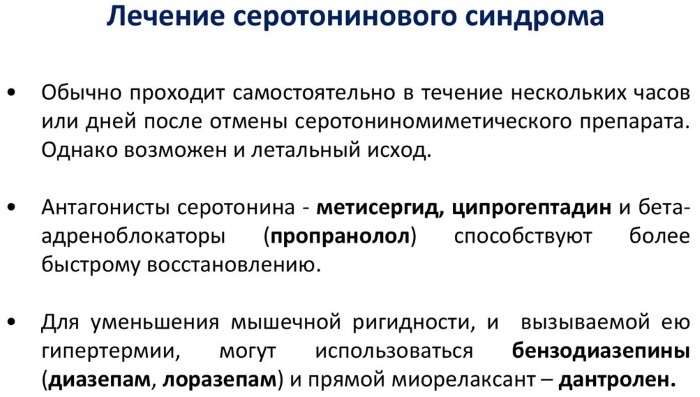
The doctor prescribes various medications for the patient to eliminate certain symptoms.
Essential medicines and their purposes of use:
- Polysorb, Enterol and Activated carbon. These drugs are prescribed to remove the drug that caused serotonin intoxication from the patient's body.
- Adrenaline and Norepinephrine. These hormones are used to bring blood pressure back to normal.
- Sibazon, Lorazepam, Nitrazepam and other similar drugs. They eliminate epileptic seizures, anxiety disorder, insomnia and normalize muscle tone.
- Amiodarone, Diltiazem, and Verapamil. They are effective against arrhythmias.
- Cyproheptadine and mitisergide. These serotonin suppressants work by blocking excess serotonin.
- Nurofen, Paracetamol and Ibuklin. It is an antipyretic with an analgesic effect. They are used to normalize body temperature. Cold rubdowns are also used, ice and any other methods of external cooling are applied.
- Aksert, Imitrex and Maksalt. These drugs are used to combat headaches.
- Crystalloid and colloidal solutions. They are injected into the human body intravenously through a dropper. Such solutions resume the normal functioning of metabolism, restore fluid and blood volume in functioning blood vessels. Their use will help to avoid the termination of the work of all body systems.
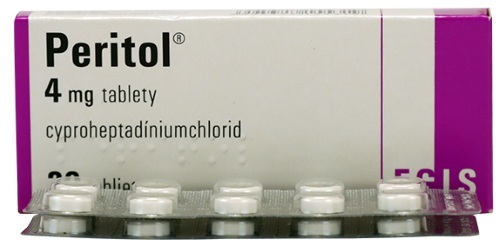
A person in an advanced stage must be urgently hospitalized at the nearest hospital. In stationary conditions, the work of the heart will be continuously monitored. The patient will receive oxygen and infusion therapy. He will also be injected with Cyproheptadine, a substance that weakening the effect of serotonin.
Preventive measures
The basic rule of prevention is the limited and correct use of antidepressants. It is important to observe monotherapy, not to combine them with taking other medications. 2-6 weeks should pass between 2 treatment courses. Antidepressants should only be taken as directed by your doctor. Self-treatment can lead to negative results.
Patients who have recovered from serotonin syndrome can continue their course of treatment no earlier than 2 weeks. During this time, the body must be completely cleansed of serotonergic drugs and begin to function fully.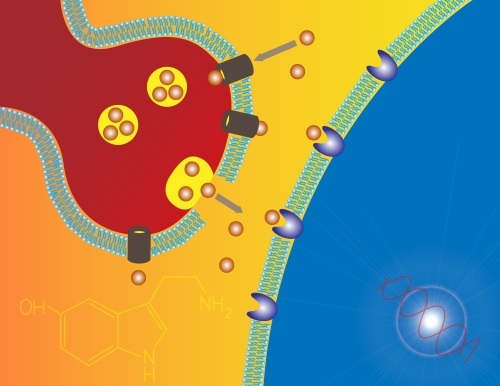
In the future, it is recommended to use drugs that are exclusively low in serotonin. The drug should be re-administered at a reduced dose. To determine the effectiveness of the drug, the introduction should be carried out drip and slowly.
Consequences
Complete ignorance of serotonin syndrome and not receiving the necessary medical care will lead to the most dangerous consequences:
- acute hepatic renal failure;
- deterioration of blood clotting;
- malfunctions of the cardiovascular system;
- violation of alkaline metabolism;
- destruction of muscle fibers;
- severe coma;
- death.
A disease such as serotonin syndrome is completely curable. It will not affect the human body in the future. In the future, you must follow the rules for taking antidepressants and other drugs so as not to suffer again.
Video about serotonin syndrome
Doctor about serotonin syndrome:



